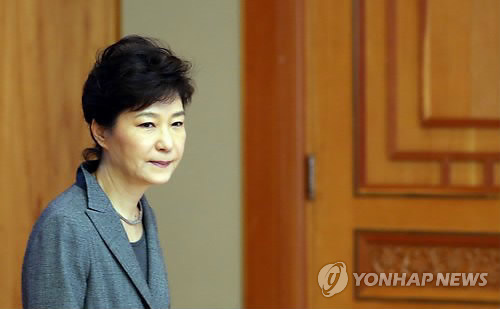At a Cabinet meeting a day before Wednesday’s general election, President Park Geun-hye urged voters to cast their ballots to form a “new National Assembly devoted to securing people’s livelihoods and revitalizing the economy.”
Park deplored what she described as losses caused by the blocking or delay of the passage of reform bills in the outgoing parliament.
The answer from the electorate, who deprived her conservative ruling Saenuri Party of its majority in the 300-member legislature, apparently reflected their discontent or anger with the president’s inflexible stance that has put the blame on political circles for all economic troubles plaguing the country.
Park deplored what she described as losses caused by the blocking or delay of the passage of reform bills in the outgoing parliament.
The answer from the electorate, who deprived her conservative ruling Saenuri Party of its majority in the 300-member legislature, apparently reflected their discontent or anger with the president’s inflexible stance that has put the blame on political circles for all economic troubles plaguing the country.

But few economists here seem to believe the election results would lead to reducing increasing political risks to Asia’s fourth-largest economy at the crossroads of being drawn into prolonged downturn or revitalizing growth momentum. In the run-up to the presidential election scheduled for late next year, measures needed to boost economic vitality may continue to be held hostage to political rivalry and populism.
Conspicuously missing from the latest election campaign was serious debate on how to tackle economic and other thorny tasks confronting the country. Leaders and candidates of the main political parties had barely mentioned Korea’s slowing growth and weakening competitiveness while preoccupied with gaining votes by appealing to regional sentiment and pointing fingers at opposing sides.
The only time the two major parties came close to an economic policy debate during the campaign was when former Finance Minister Kang Bong-kyun, who headed the work to draw up the ruling party’s election pledges, proposed a drastic easing of monetary policy. He floated the idea of the central bank printing money to buy industrial finance bonds and mortgage-based securities to address the two key tasks confronting the Korean economy: overhauling loss-making and heavily indebted companies and curbing mounting household debt. He dubbed his proposal a Korean version of quantitative easing to differentiate it from broader asset purchase programs in other advanced economies.
The liberal main opposition Minjoo Party of Korea criticized Kang for trying to divert the public’s attention from the need to advance economic democratization, a concept that is understood as exerting efforts at curbing the influence of large business conglomerates and reducing income inequality that has been polarizing the Korean economy and society.
Voters appeared to have shown more sympathy with the opposition party’s criticism of the way the Park administration had handled the economy by giving more parliamentary seats to it than the ruling party at Wednesday’s election.
“It will be virtually impossible to put into practice quantitative easing, given the structure of the incoming legislature,” said Shin Dong-su, a researcher at Eugene Investment & Securities.
Promoting economic democratization alone will be insufficient to solve difficulties facing the country. Given tough conditions at home and abroad, many economists note that Korea needs to do more than quantitative easing.
Government policymakers have recently been trying to shed light on a rebound in manufacturing output and an improvement in business and consumer sentiments as signs of the economy having hit the bottom. But economists still caution that Korea may suffer further slowdown, taking note of decreasing corporate investments and retail sales.
In its latest World Economic Outlook report released this week, the International Monetary Fund lowered its 2016 and 2017 growth forecasts for Korea to 2.7 percent and 2.9 percent, respectively, down from its January predictions of 2.9 percent and 3.2 percent.
Policymakers here have stuck to keeping this year’s growth above 3 percent. The possibility of achieving this goal is becoming dimmer amid declining exports and stagnant domestic demand. It may be against this backdrop that Finance Minister Yoo Il-ho recently pulled back from his earlier negative response to Kang’s proposal, saying it “makes sense.” He went further to advocate fiscal stimulus, on which he had remained cautious.
Economists with more hawkish views argue Korea needs to use all possible means, including fiscal and monetary policies and structural reforms, to boost the economy in the near term and expand its long-term growth potential. They say politicians are required to assume the role of prodding administration policymakers to pursue these measures in an active and persistent way.
The two major parties showed a sharp contrast in their priorities of election pledges. The Saenuri Party focused on boosting domestic consumption and nurturing future growth engines, while the Minjoo Party put emphasis on expanding welfare and enhancing balanced growth between large and small businesses. The splinter People’s Party, which is set to hold a casting vote between them, may play a meaningful role in steering the new parliament in the direction of enabling the country to shift from its outdated economic paradigm that is reaching its limits.
By Kim Kyung-ho
(khkim@heraldcorp.com)
-
Articles by Korea Herald








![[Weekender] Pet food makers bet big on ‘recession-free’ pet food market](http://res.heraldm.com/phpwas/restmb_idxmake.php?idx=644&simg=/content/image/2024/05/10/20240510050754_0.jpg&u=20240511163252)










